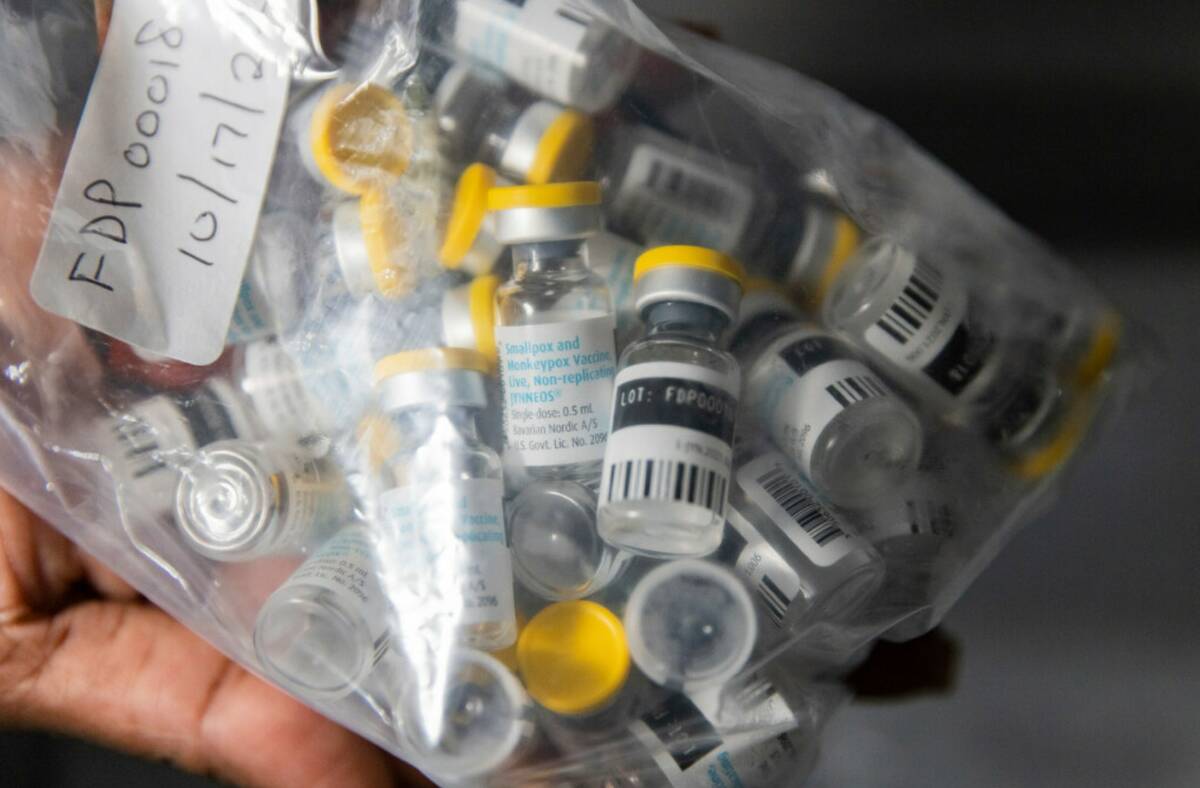Mpox outbreak may be nearing an end in Nevada
With cases of monkeypox — or mpox, as it’s now being called — slowing to a trickle, is the outbreak over?
“I can’t say it’s eradicated,” Cassius Lockett with the Southern Nevada Health District said of the once-rare virus that has triggered outbreaks around the globe this year.
“It does appear that it’s under control,” said Lockett, the district’s director of disease surveillance and control.
Only one new case was reported in Clark County in the first half of December, according to the most recent data from the health district. In contrast, during the second half of August, which is when the district began to post weekly mpox data, there were 66 new cases.
There have been 288 cases reported in the county since June, when the first local case was identified. In October, a death was reported in a resident with mpox, though the cause of death in the immunocompromised man was attributed to other factors.
This year, there have been nearly 83,000 cases of mpox identified in dozens of countries, including almost 30,000 cases and 20 deaths in the United States.
Vaccination events credited
The virus has primarily been spreading in the social networks of men who have sex with men, through close skin-to-skin contact, especially sex. However, anyone can become infected with mpox, which last month was renamed from monkeypox by the World Health Organization, citing concerns that the original name could be construed as discriminatory and racist.
Nurse practitioner Rob Phoenix, founder and owner of The Huntridge Clinic, said he’s hopeful that U.S. outbreaks are resolving. He credits vaccination events targeting those at highest risk with helping to curb the disease.
“They took public health literally to the streets,” he said, deploying mobile units to spots where those at heightened risk were gathering, including gay pride parades and events.
He continues to talk with patients about ways to minimize the risk of contracting the disease, conversations that he’d like to see normalized.
“I don’t think we can just strike this off our list of questions and things to think about,” said Phoenix, whose clinic serves the LGBTQ community.
One of the clinic’s patients was diagnosed with mpox as recently as Monday. The patient had received both doses of the Jynneos vaccine, which could explain why he had only one lesion and a mild case, Phoenix said. The patient did not experience the fever, headache, muscle aches and exhaustion that often precede developing a rash and lesions.
The lesions can be extremely painful and lead to scarring. Antiviral drugs developed to treat smallpox, a more serious disease in the same family of viruses, and drugs for treating AIDS are used to treat mpox.
Continuing threat
Earlier this month, Department of Health and Human Services Secretary Xavier Becerra said the department does not expect to extend the declaration of a public health emergency when it expires in January.
“But we won’t take our foot off the gas — we will continue to monitor the case trends closely and encourage all at-risk individuals to get a free vaccine,” he said in a statement.
In Clark County, the health district is focused on getting second doses of vaccine into arms, Lockett said. More than 7,800 doses of vaccine have been administered in the county.
U.S. health officials have said it may be impossible to eliminate the disease, warning it could be a continuing threat mainly for gay and bisexual men for years to come.
In Clark County, 96 percent of mpox cases have been in men. Eighty-nine percent of cases have been in people identifying as LGBTQ+ and 8 percent in heterosexuals, with the sexual orientation of 3 percent unknown, according to health district data.
Before May, mpox, a disease that is thought to originate in animals, was not known to trigger large outbreaks beyond central and west Africa.
Outside of Africa, nearly all cases have been in gay, bisexual or other men who have sex with men. Scientists believe mpox triggered outbreaks in Western countries after spreading via sex at two raves in Belgium and Spain.
Vaccination efforts in wealthier countries, along with targeted interventions, have dramatically reduced case numbers after they peaked in the summer.
In Africa, the disease mainly affects people in contact with infected animals such as rodents and squirrels. The majority of mpox-related deaths have been in Africa, where there have been almost no vaccines available.
The last mpox outbreak in the U.S. was in 2003, when 47 confirmed and probable cases were reported, all from contact with pet prairie dogs. The pets were infected after being housed near imported small mammals from Ghana, according to the CDC.
This was the first time that a case in a human was reported outside of Africa.
Monkeypox was first discovered in 1958 when two outbreaks of a poxlike disease occurred in colonies of monkeys kept for research, hence the name. The first case in a human was recorded in 1970 in the Democratic Republic of the Congo.
Contact Mary Hynes at mhynes@reviewjournal.com or 702-383-0336. Follow @MaryHynes1 on Twitter. The Associated Press contributed to this report.


















